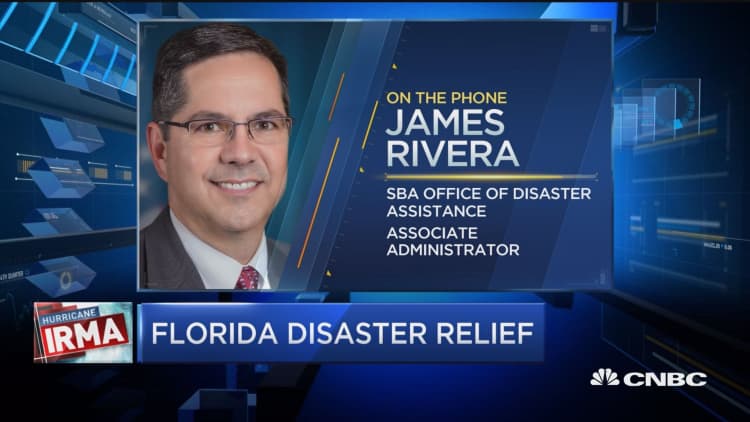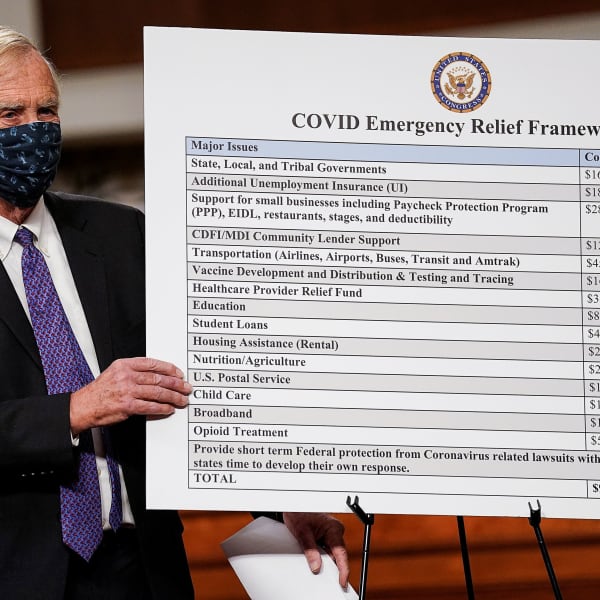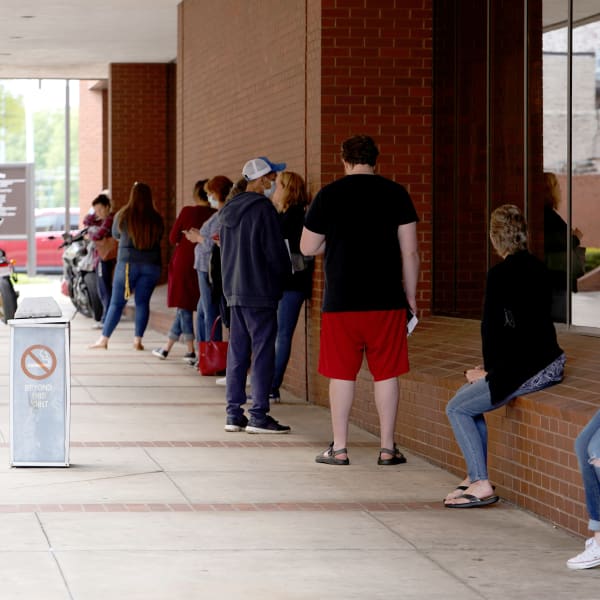One of the hard lessons many small businesses are learning after the devastating impacts of Hurricanes Harvey and Irma is that a disaster plan is essential — even if you think you'll never need to use it.
According to the Federal Emergency Management Agency (FEMA), almost 40 percent of small businesses never reopen their doors after a disaster. Recent data from a CNBC/SurveyMonkey Small Business Survey also shows that most small business owners don't spend too much time thinking about the environment as a critical factor.
Eight percent of business owners in the second quarter survey said the environment is the factor that most matters to them. The percentage goes down for business owners in the South Atlantic (5 percent) and West South Central (6 percent). Jobs and the economy, health care, terrorism, immigration and "other" ranked higher.
Meanwhile, business owners in the South Atlantic (64 percent) and West South Central (62 percent) said they expected revenue to increase in the next year, the highest level of sales confidence among owners in all U.S. regions.
Having a disaster plan in place might not prevent the worst-case scenario, but it could increase a company's odds of survival.
A little bit of work now can pay off down the road. Here are five things a small business may want to focus on.
1. Keep your company records in the cloud.
Some disasters, like a hurricane, give you time to collect important items before you flee. Others, like a fire, offer no warning whatsoever. Things like invoices, contracts, tax returns, budgets and insurance policies are essential to businesses, though. And some will be critically important when you're dealing with an insurance company or applying for relief funds.
"A lot of small businesses don't have a process to protect themselves," said Mike Crincoli, president of The Neat Company, a document scanning/cloud storage company that caters to small businesses.
"Things like expenses and contacts and client data are very important, so it's essential they have a system to protect their records," he said. "It's very important to stay ahead of it."
2. Establish policies for employees, vendors and customers.
The ripple effect of a disaster on a business can be easily overlooked, as owners focus entirely on rebuilding or reopening. Insurance might cover your immediate financial losses, but you'll also need to have a plan in place to hang onto customers and other business relationships during that rebuilding phase.
And you don't want to lose your best employees either, even if you're unable to pay them during the closure.
"News travels fast and perceptions often differ from reality," noted the Department of Homeland Security's Ready.gov website. "Businesses need to reach out to customers and other stakeholders quickly. Customers expect delivery of products or services on time. If there is a significant delay, customers may go to a competitor."
The American Red Cross suggests three separate plans for employees, suppliers and clients. For customers, be sure to have contact numbers for everyone and set up a communications infrastructure. Also, have a clear plan that's communicated to your workers on how their payroll and leave would be affected by a disaster.

For vendors, again, make sure you have all necessary contact information, and develop backup plans in case vendors are unable to get necessary products to you. (A disaster in their area that's nowhere in the area can still have significant impacts.)
When it comes to customers, keep the contact information of your most critical ones, so you can stay in touch with them during any period you're shut down. And try to have a plan in place to keep them supplied until you're back up and running.
Update all contact lists regularly and make sure they're accessible from any location. The important thing to keep in mind is it's critical to respond promptly, accurately and confidently to all of these groups. That can be tricky when you're dealing with the stress of an emergency, so Homeland Security noted it's best to have pre-scripted messages for each group — meaning you'll have to consider a number of different disaster scenarios and have the right messaging for each one.
3. Develop a continuity plan.
The heart of a disaster plan is a continuity plan, since it helps businesses continue operating even after an emergency. First, identify which operations are essential (or time-critical), and designate which employees will carry those out. This may require some cross-training of employees in advance (which can also come in handy if you an essential staffer leaves for another job).
The government suggests continuity plans be built using four steps: Conduct a business impact analysis to determine the most critical business functions. Next, develop recovery strategies to fill potential gaps brought on by an emergency. Work with a team, if possible, to develop the formal plan, as employees might think of weak spots the owner might miss.
Finally, educate your entire staff about the plan and train them on their responsibilities.
4. Do a threat analysis.
Business owners will want to factor in all potential hazards when creating their emergency plan. Some disasters, like fire and tornadoes, can happen anywhere. But it's wise to conduct a risk assessment of your businesses location to see what else could happen.
Are you within striking range of a major hurricane? Has there been any historic flooding? If you're in any sort of metropolitan area, have you considered terrorism? And don't forget cyber attacks. (Too many small business owners actually downplay that threat: Only 2 percent of the small-business owners surveyed in the CNBC/SurveyMonkey Small Business Survey said they view the threat of a cyberattack as the most critical issue they face.)
5. Run drills.
A good plan is useless if no one knows how to execute it when disaster hits. Work with employees regularly to ensure things will run smooth in the case of an emergency, and have a loyal customer and vendor you can use as test subjects during those drills. I
It may seem a waste of time, but if the unthinkable happens, it could mean the difference between a company's survival and an out-of-business sign.
—By Chris Morris, special to CNBC.com




